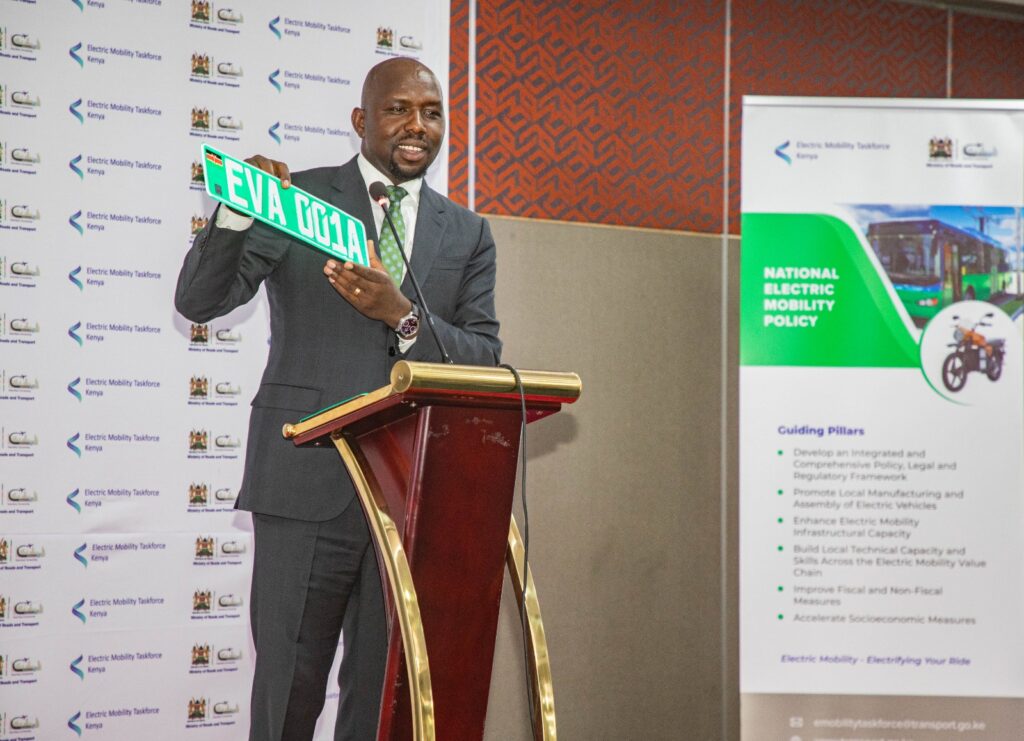
KENYA. Dawn Of New Era as Ministry Launches Draft Electric Mobility Policy
The Ministry of Roads and Transport earlier today, launched Kenya’s first Electric Mobility (e-mobility) Draft Policy at KICC in Nairobi. Cabinet Secretary for Roads and Transport, Hon. Kipchumba Murkomen, described it as a pivotal moment for Kenya, ushering in a new era in transportation. The policy will guide the development of electric mobility in all transportation modes – road, rail, air and maritime, by providing a transition framework from the use of conventional internal combustion engine (ICE) vehicles.
The CS highlighted the benefits of the policy, including a reduction in emissions, lower operating costs, decreased reliance on imported fuels, and the creation of green jobs. He emphasized the need for Kenya to embrace new ideas and move away from old practices to improve travel, the environment, and the economy.
The CS urged Kenyans to review the draft policy and suggest improvements during the public participation phase. He emphasized that the policy would guide efforts to mitigate climate change and solidify Kenya’s global leadership in renewable energy. The CS thanked the Task Force for their work in developing Kenya’s first national electric mobility policy and acknowledged the support of the German Corporation for International Cooperation (GIZ).
The CS also announced the assignment of green-colored number plates to all electric vehicles, including two-wheelers, to raise awareness and encourage more people to switch to e-mobility. Charging infrastructure will also be set up at Transcom House, the Ministry of Roads and Transport’s headquarters.
In his remarks, Principal Secretary State Department for Transport, Mohamed Daghar, emphasized e-mobility’s role in the Government’s Bottom-Up Economic Transformation Agenda (BETA) and its potential to create job opportunities, especially for the youth.
Task Force Chairman, Mr. Daniel Ngumy, outlined the draft policy’s objectives, including the development of a comprehensive framework to promote e-mobility adoption, local manufacturing of Electric Vehicles (EVs), enhancing infrastructural capacity, and improving technical skills in the e-mobility sector.
The policy also addresses the issue of peak and off-pick demand in Kenya, suggesting that e-mobility could help bridge the gap by charging EVs at night. The policy estimates that the daily curtailed energy could power about 7,000 electric buses or over 200,000 electric motorcycles.
Additionally, the Draft Policy includes measures to enhance gender equality and social inclusion in the e-mobility ecosystem, aiming to incentivize women, youth, and people with disabilities to participate in e-mobility-related economic activities.
The launch was attended by Cabinet Secretary for Investment, Trade, and Industry Hon. Rebecca Miano, Principal Secretary for Environment and Climate Change, Eng. Festus K. Ng’eno and Kenya Private Sector Alliance (KEPSA) CEO, Carol Kariuki.
Electric mobility aligns with Kenya’s National Climate Change Action Plan (NCCAP) 2023-2027, Long-Term Low Emission Development Strategy (LT-LEDS) 2022-2050, and the Nationally Determined Contribution (NDC) to reduce greenhouse gas emissions by 32% by 2030.
The National Electric Mobility Task Force was gazetted by the Cabinet Secretary for Roads and Transport Hon. Kipchumba Murkomen on 4th August 2023. The Public Participation forums schedule for all regions in the country will soon be published in the local dailies and on the Ministry website.